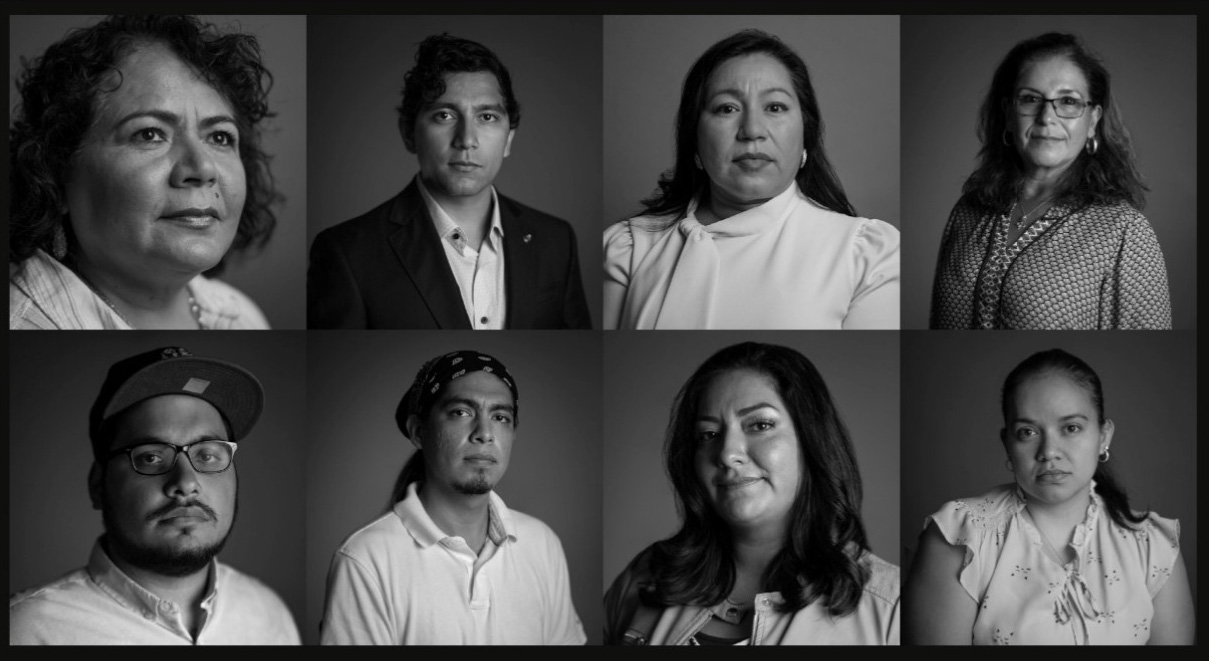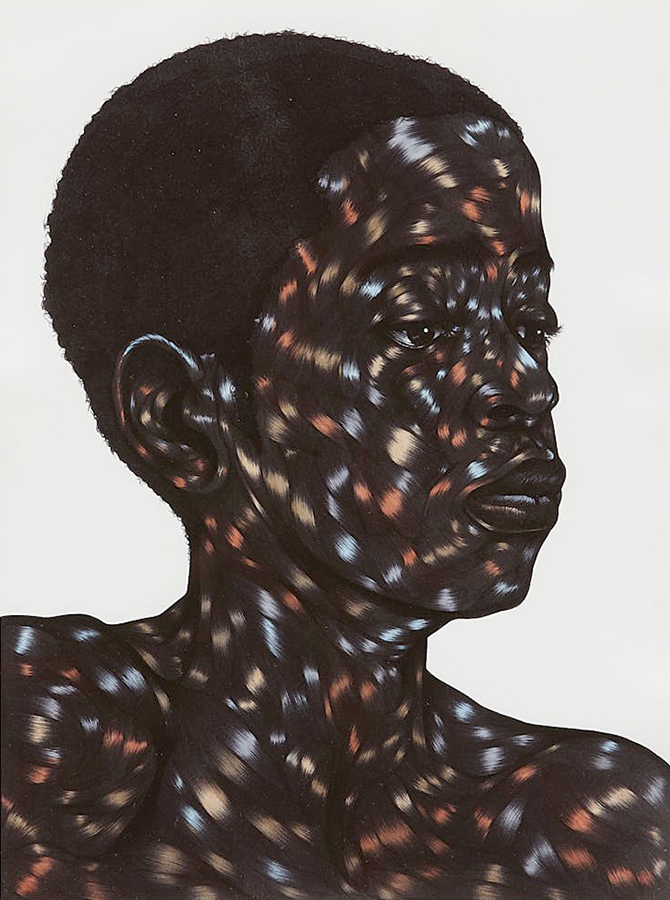Scroll down to listen to Christian Wiman reading his poem, “Every Riven Thing.”
“What is poetry’s role when the world is burning?” Christian Wiman wonders in his book “My Bright Abyss.”
The poet and former editor of Poetry magazine asked the question in the fallout of a cancer diagnosis that led him back to Christianity, but the question’s ongoing pertinence for the church and the world -- whose flames have only gotten higher since the book was published in 2013 -- is clear.
In his newest book, “He Held Radical Light,” the role of art -- its significance in a world where life feels so fleeting and its relationship to faith -- remains at the forefront. Wiman recounts many meetings with poets over the years and wonders about the impermanence of their words with the passage of time.
 In the face of this inevitable vanishing, he comes to realize that art requires a degree of faith from the artists. They must create with the knowledge that nothing of theirs will last.
In the face of this inevitable vanishing, he comes to realize that art requires a degree of faith from the artists. They must create with the knowledge that nothing of theirs will last.
Wiman is a professor of the practice of religion and literature at Yale Divinity School, a post he took up after leaving Poetry, and is the author, editor or translator of a dozen books.
While at the 10th-anniversary conference of Duke Initiatives in Theology and the Arts, he spoke with Faith & Leadership’s Chris Karnadi about the book, poetry as faith, and why churches need poetry and art generally. The following is an edited transcript.
Faith & Leadership: How would you describe your books “My Bright Abyss” and “He Held Radical Light”?
Christian Wiman: “My Bright Abyss” is hard to describe. There’s a lot of poetry. There’s a lot of theology, and there’s some autobiographical writing. There’s a lot of literary criticism in it, and it’s just all jammed together. I wasn’t doing it consciously; that’s the way my mind works. That book took seven years to write; it was incredibly slow and painful. I was in the hospital for a month when I finally finished it. I had it scattered all around the floor, and I was piecing it together.
“He Held Radical Light” was quick. I think I wrote that in a summer. It’s like a sustained essay, 120 pages or so. It doesn’t look like it has a single argument, but it does. It just bounces around among those anecdotes.
I had all these fascinating encounters with poets over the years, and I wanted some way of linking them together. I saw them all suggesting some aspect of faith that was important to me, and so I began writing about them and linking them together.
Donald Hall was a good friend of mine; he died before that book was published. As a matter of fact, I dedicated the book to him, but I did that while he was still alive. I sent him the galleys, and so he read it, and that was the last book he read in his life. It was just an astonishing arrangement of events there, because he meant so much to me. It was just amazing.
F&L: Part of the theme of the book is about the lastingness of poetry or words. A lot of the poets that you talk about meeting have recently passed, including Mary Oliver. Is there a significance to that?
CW: Oh, I was definitely conscious of trying to rescue something [of their poetry] as much as I could -- but it can’t be rescued. I mean, I think all these poets are going to vanish.
I think Mary Oliver is going to vanish. Donald Hall’s work is going to vanish. It all is going to go, but nonetheless, there is some necessary meaning in resisting that. There’s some human necessity in resisting that onslaught of oblivion. I’ve been moved by all of these different works, and I wanted other people to be moved by them too.
I think there is nothing lasting. I think nothing human is lasting, and even Shakespeare is going to vanish eventually. It’s actually happening now. His language is becoming more and more difficult for people to read, and it will be like Chaucer eventually, and then we’ll go another hundred years and it will be like a foreign language.
But eventually, we’re all going to vanish too. When I was young, the notion of an immortal work of art was what I was after. I thought you could stamp yourself in time. I thought I would write one poem that would just arrest time and put me in it right there. That seems to me a real pipe dream now.
F&L: You talk about a moment when you were 38 and Donald Hall turned to you and said that he was 38 when he realized not a word he wrote was going to last.
CW: Yeah. And he was a famous poet when he was 38. His work was covered in The [New York] Times and Time magazine. All these places covered him, and yet he realized at 38 that it was destined for oblivion.
F&L: How does realizing that inevitability of something vanishing impact a poet’s work?
CW: Well, I feel a great sadness for other people’s work. I don’t feel so much for my own. I feel released from that, but I feel a great sadness for other people’s work, the work that has moved me the most to think that it will vanish. But I also feel at some point that God released me from that anxiety -- and I talk about that in the book -- just released me from that anxiety of wanting to stick myself into time permanently or something.
I still love poetry more than ever, actually. Not my own so much; I have a very antagonistic relationship with my own poems. But I love other people’s poems, and I still really love writing poetry. I just don’t expect it to save me, I guess, as I once did.
F&L: Is poetry important for the church?
CW: Well, I have two answers. In one way, I don’t see how it couldn’t be, since half the Bible is in poetry. I actually have pastors say to me that they don’t understand poetry, which means they don’t understand half the Bible, because it is literally verse. I mean, the book of Job is among the greatest poetry that humans have ever produced.
So yes, in that sense, obviously, poetry is incredibly important to the church, and I would say that you can’t read the Bible if you don’t learn to think metaphorically.
That’s one answer. But another answer is that church services are boring. Half the time in church, I just feel like I have to stick myself to stay awake, and the church desperately needs ways of waking itself up. Poetry is one of those ways. It’s not the only way, but art, broadly speaking, I think, is desperately needed in the church.
F&L: And if Christian leaders aren’t practitioners of poetry or any type of art, should they try their hand at it?
CW: Well, writing it can make you appreciate how difficult it is, the way playing an instrument can make you appreciate how difficult music is. But gosh yes, I think everybody should try it.
People get put off, mostly because they think of high modernism; they think poetry is a really difficult, inaccessible thing. But there are so many different kinds of poetry and so many different ways in at this point, and the internet makes it easy. So yes, I think you should just try your hand at it.
I was invited a few years ago to go down to Dallas and work with a group of a hundred Baptist ministers who wanted to get poetry into their congregations, and they weren’t writing poetry. They wanted to figure out how to read it, how to use it, and that was an astonishing experience for me, and heartening.
F&L: “He Held Radical Light” treats this over the course of its sustained essay, but what is the relationship between art and faith? And what is the faith of art?
CW: Well, they’re very much raveled together for me, but I guess my experience has been that art is not enough. And that’s led me to need to declare a faith in something beyond art: faith in God. But a lot of what the book is about is people who have made art that seems to me an expression of faith, what I would call faith, but they actually have disdain for the notion of faith, of any kind of institutionalized religion. So I was exploring why that is.
How can it be that you have this moment of intense rapturous experience making a work of art -- which seems to me the Holy Spirit -- and then afterward you just leave it behind like it’s dead? It doesn’t become integrated in your life at all; you don’t ask yourself, “What in the world has happened to me that I could make that?”
I did that for a long time, and then at some point, I began asking, “What is going on? What am I not facing on the other side of the experience?” So the book partially is an attempt to answer that.
F&L: So if art is a type of faith, is faith also an art?
CW: Thoreau had this notion that his life was a work of art, and it would have had more writing, he said, but he was working on his life. I understand that intellectually, but I don’t really feel it in my own life. The action of writing poetry, making poems, seems to me so different, so erratic, with long silences in between, and life just seems so cluttered and relentless. I don’t have those kinds of experiences with God that I have in poetry -- I don’t have them elsewhere. I wish I did.
I find church a very difficult enterprise. We go -- and I love parts of it -- we go to an evangelical church. I mean, I gave up on liberal Protestant churches; I was just falling asleep. So this one I do feel the spirit of God in there, and it’s incredibly diverse. It’s about half black and a real mix of people -- very young -- but there’s a lot that I just don’t agree with. You’re not supposed to agree with everything in your church.
F&L: You call “My Bright Abyss” a “meditation of a modern believer.” What is a modern believer, and are all believers modern in the sense that you mean?
CW: No. I think some believers are cave men deliberately, desperately living in the past, and I think it takes a real blindness, a willful blindness, to do that. It’s a sin, and I think part of Christ’s message is contingency. Everything is changing, and the message has to be made new. It wasn’t this thing that got delivered 2,000 years ago that we can carry like a rock into the present.
What he gave us was a way of being, and you have to enter in a different way over and over and over, and there’s just no solid place to stand.
I think that’s what it means being a modern believer, and I think that’s the reason art is so good or useful for theology these days. Art’s premise is that you have to enter into this process over and over in order to get anywhere, and there’s not some product that’s going to rescue you.











